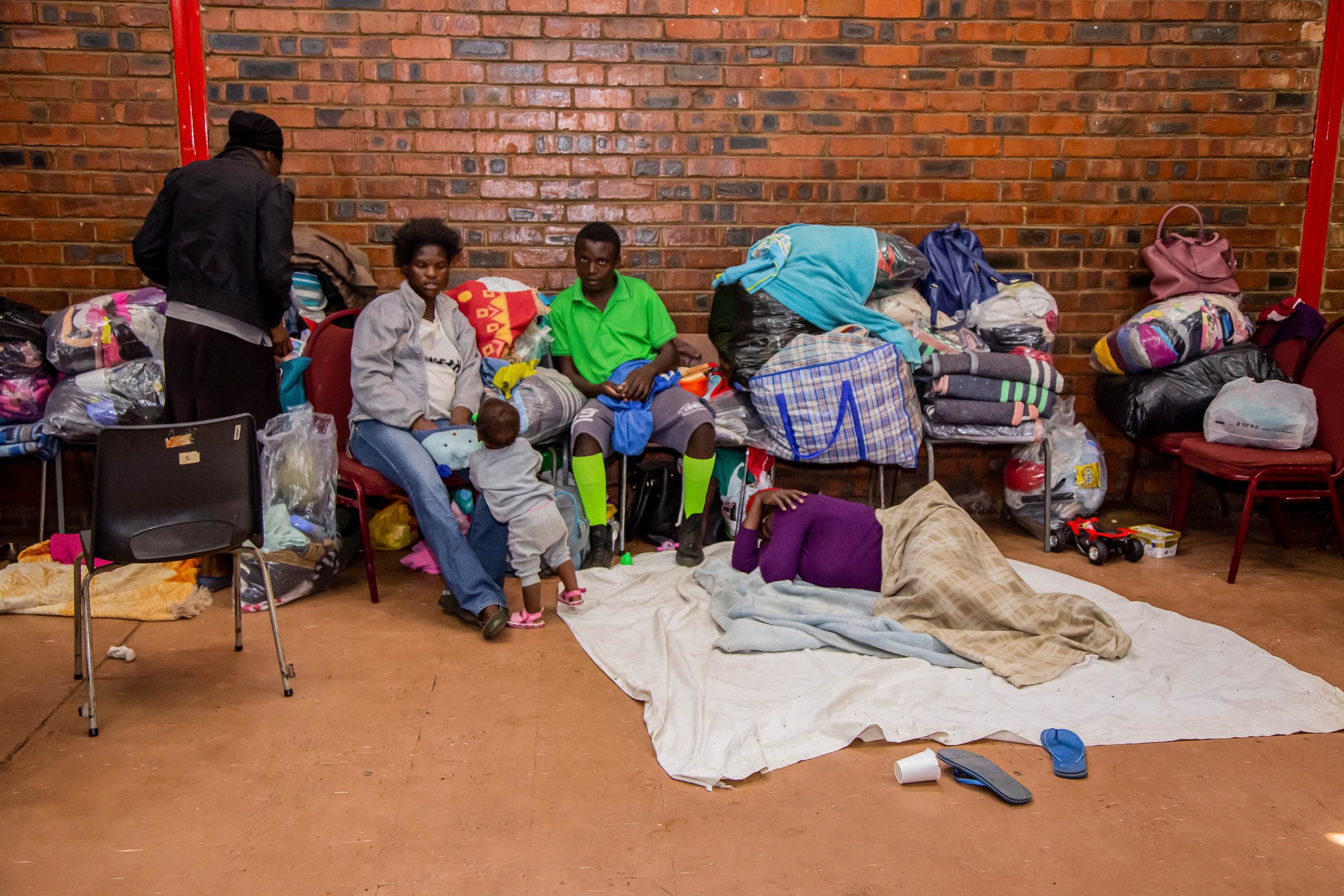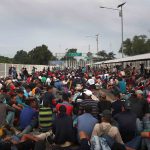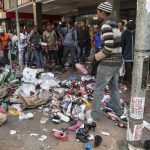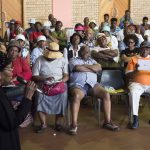Xenophobia victims bussed back home
Gauteng’s disaster management centre and a number of aid agencies are helping migrants affected by the xenophobic attacks in Katlehong to return to their home countries. But not everyone wants to g…
Author:
13 September 2019

In an attempt to escape the smothering poverty in their own countries, many people took the courageous step years ago to start new lives in South Africa, where economic prospects appeared less bleak.
Teresa Makamu, 28, is one such woman. Carrying her one-month-old son on her back, she explains how she arrived in Katlehong last year after moving from Durban, where she had lived since 2008. She is originally from Manyisa in Mozambique.
Makamu says the unexpected xenophobic violence that she, other members of her family, and friends have experienced has left them feeling devastated and hopeless.
Related article:
But beyond the violence, as someone who reveres the impact of education, her concern is for the future of her children’s education. She has two other sons, one in grade 1 and another in grade 4.
“What hurts me most is the issue of my children because even if we leave for home, they will just sit at home and be useless. They won’t be able to learn because they were learning here.
“We are busy walking up and down like cows with little babies. We are always crying, losing weight. It’s better if it’s the younger ones but the ones who are studying, my God, they are even crying because they were used to going to school,” she says.
Makamu’s oldest son managed to write just one exam before the violence erupted.
“Look, now they are not going to school … Once it was over for us, it was over for them,” she sighs, rocking her baby.
Disrupted education
Makamu is not eager to return home, saying that things are not good in Mozambique and that it will be difficult for her children to start school afresh.
“It will be hard for my children to go to school back home. If [only] I could find money to rent a shack for my children so they can finish school and for us to remain,” she says pensively.
Makamu has been staying at the DH Williams Community Centre in the township of Katlehong on the East Rand for more than a week. The centre is packed with chairs, sponge mattresses and plastic bags of donated goods and the few items salvaged during the violence.
Related article:
Many of those staying at the centre walk around aimlessly in confusion, uncertain of who to ask for what and for which services to register. Department of Home Affairs officials are helping them to register their particulars, while Ekurhuleni Metropolitan Police Department units are helping them return to the scene to salvage what they can before they are bussed home.
In what is the third-biggest township according to the 2011 census, violence flared up when a group of residents attacked migrants, setting their homes, identity documents and belongings alight. They had gathered before the attacks to warn landlords renting shacks to “foreigners” about their imminent orchestrated move.
Burnt documents
When the attacks started in the Mandela section of Katlehong on 2 September, Makamu says her day was interrupted. Makamu’s landlord told her to move her possessions so that her home would not be burned down. She immediately looked for her children’s documents but forgot about her own, which ended up being lost in the fire. She was too busy running to see if she recognised anyone or knew if they were from her section.
That night, she says, her family of five took refuge at the police station before they were moved to the community centre where they have been staying since 3 September.
Rose Khoza, 29, is concerned about how she will get medication for herself and her four-year-old son. They are both sick. She is a single mother who moved to Johannesburg from Manyisa in Mozambique after she lost her parents.
In 2017, the father of her son was shot and killed while making his way to a building job at 4am.
Khoza has been selling amagwinya (vetkoek) to provide for her child, send money to her other son and pay her monthly rent of R300.
“When this started, all I took was enough food in a lunch tin for my son … they were singing while advancing towards us,” she says.
Dependent on handouts
“This is really hurting us, we have lost a lot of our things … We have no clothing, nothing, just what they have given us. They burned our shacks and our clothes. While we are sitting here, at least we are being helped because we had nothing at all when we arrived here, our children were barefoot,” says Makamu, explaining that she needs to queue for the nappies being handed out by disaster management.
“I just came to see what life is like here [in Johannesburg], but now we are facing this … we were told there is money to be made here, but Durban is better than here,” she says.
Related article:
The next day, she remembers, her landlord “killed the fire, swept, cleaned and locked the door because she no longer wants a Shangaan there”.
Before the onset of the xenophobic violence, she and her husband Alex, 32, were renting for R300 a month. But when things started getting tense and uncertainty increased, the landlord said they could pay R150 a month. Makamu and her husband covered the rent through money she made from hair braiding or money he made by selling anything he could find.
She says they were told they would be returned home as they cannot stay indefinitely at the community centre.
Lindela fears
“We will not have a place to stay at some stage, which means we might have to be moved to Lindela [Repatriation Centre for undocumented migrants] … We don’t want to go there because we know that life there is not good, my friend has been there and confirmed,” she says.
Elias Sithole, the head of the Gauteng Provincial Disaster Management Centre, says his staff were still in the process of assisting people to return to their home countries. The first group was scheduled to have left on Thursday 12 September.
Makamu says she would have preferred to be warned than given money to go back home.
“Some people are from far, and they have to phone the family to [ask them to] come and get them and you will find those families don’t have money either, they are also poor so people could die even where you are dropping them off because how will they live? That is why some of us did not want to go back home without preparing properly,” she says.
According to statistics provided by the disaster management centre, it was assisting 583 adults and 218 children whose countries of origin include Malawi, Zimbabwe, Mozambique, Ghana and Lesotho. Of those asked, 487 confirmed that they wanted to return home.
‘Scared and overwhelmed’
The chair of the African Diaspora Forum, Vusimuzi Sibanda, says this number is likely to drop.
“They saw people being torched and burned … Some people are still scared and overwhelmed, so they just want to go and take a breather. But they are all saying there is nothing to go back home to,” he says.
Sibanda, who was at the nearby Thulo Hall, says repatriation processes have already been put in place for the body of Isaac Sithole, 35, who was beaten, set alight and burned while running from his burning home last week.
Sibanda explains that Sithole’s wife, Lydia Chimbirimbiri, 31, has three children. One living in South Africa aged six weeks, and two aged seven and 10 who live in Zimbabwe. She is unemployed. Sithole was the family’s sole breadwinner.
Related article:
“There is nothing worse that could’ve happened to them … her life is completely over,” says Sibanda. “We are worried about the approach that government is taking. They want to protect the image of the country at the expense of people. This is a PR exercise where the government is busy showing that it’s worried about how people perceive South Africa. Let’s deal with issues of migration differently, protect people in country and not be so careless and unconcerned,” he says.
Police spokesperson Lieutenant Colonel Lungelo Dlamini says they are still investigating the death of two men who were allegedly burned to death during the violence in Mandela section. No arrests have been made.
In KwaThema, Sophiatown and Brixton, the police have arrested six people for murder and public violence. Dlamini says about 597 people have been arrested so far for various crimes, including malicious damage to property, theft and public violence.




